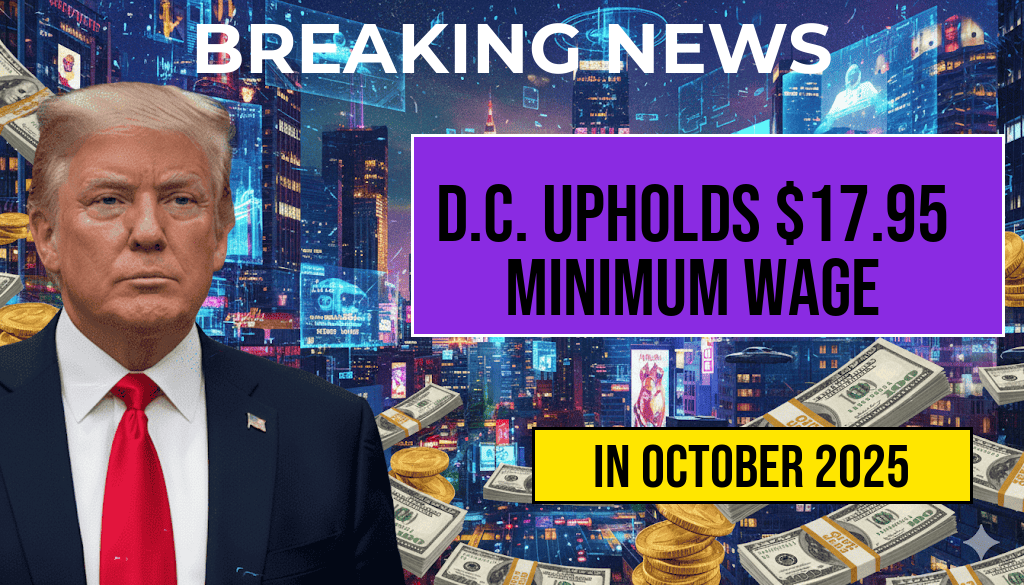As of July 1, 2023, Washington D.C. solidified its position as a leader in labor rights by implementing a minimum wage of $17.95 per hour. This increase, part of a gradual plan established in 2016, aims to enhance the livelihoods of the city’s workforce while also addressing the rising cost of living. The D.C. Council voted unanimously to raise the minimum wage, reflecting a commitment to support workers in one of the nation’s most expensive urban areas. With this new wage rate, Washington D.C. continues to surpass federal mandates and offers one of the highest minimum wages in the United States, reinforcing its progressive stance on labor issues.
The Path to $17.95
The decision to raise the minimum wage is rooted in a broader effort to combat economic inequality and ensure fair compensation for all workers. The wage increase is part of a phased plan that originally aimed to boost the minimum wage to $15.00 per hour by 2020, which was successfully achieved. Subsequent increases were set to follow, culminating in the current rate of $17.95.
Comparative Analysis
To put this wage increase into perspective, here is a comparison of minimum wages across the United States:
| City | Minimum Wage |
|---|---|
| Washington D.C. | $17.95 |
| Seattle, WA | $17.27 |
| San Francisco, CA | $16.99 |
| New York City, NY | $15.00 |
| Los Angeles, CA | $15.00 |
Impacts on Workers and the Economy
The increase in the minimum wage is expected to have several positive effects on both workers and the local economy. Advocates argue that a higher minimum wage allows workers to better afford housing, healthcare, and education. Studies have shown that higher wages can lead to increased consumer spending, which strengthens local businesses. According to the Forbes Finance Council, raising the minimum wage can also reduce employee turnover, resulting in lower training costs for employers.
Challenges Faced by Employers
While the benefits for workers are evident, some employers express concerns over the financial strain that a higher minimum wage may impose. Small businesses, in particular, may struggle to meet the new wage requirements without adjusting their pricing structures or reducing staff. The D.C. Chamber of Commerce has voiced apprehension that the increased labor costs could hinder economic growth and lead to job losses in some sectors.
Public Response and Future Considerations
The public reaction to the wage increase has been mixed. Many residents and advocacy groups have celebrated the decision as a victory for worker rights. However, others worry about the long-term consequences for employment opportunities and business sustainability. As Washington D.C. moves forward, city officials will closely monitor the impacts of this wage increase on the local economy and employment rates.
Looking Ahead
With the current trajectory, Washington D.C. sets a precedent that may influence minimum wage discussions in other cities and states. As states like California and New York begin to explore similar increases, the D.C. model will likely provide a valuable case study on the effects of higher wages. Policymakers will need to weigh the benefits of improved worker welfare against the potential challenges for businesses.
As this debate continues, residents and stakeholders in Washington D.C. remain engaged, advocating for fair wages while also considering the broader implications for the economy. The future of labor rights in the capital may well serve as a bellwether for nationwide trends.
For more information about minimum wage policies and their impacts, you can visit Wikipedia or read about the economic implications on Brookings Institution.
Frequently Asked Questions
What is the current minimum wage in Washington D.C.?
The current minimum wage in Washington D.C. is $17.95 per hour, making it one of the highest in the United States.
How does Washington D.C.’s minimum wage compare to other cities?
Washington D.C. maintains a competitive edge with its minimum wage of $17.95 per hour, which surpasses the federal minimum wage and is higher than many other major cities.
When was the $17.95 minimum wage implemented?
The $17.95 minimum wage in Washington D.C. was implemented as part of a gradual increase aimed at improving living conditions for workers in the district.
Who is eligible for the $17.95 minimum wage?
The $17.95 minimum wage applies to most employees in Washington D.C., including full-time, part-time, and temporary workers, with some exceptions for tipped employees.
What impact does the minimum wage have on the local economy?
The increase to $17.95 per hour is expected to boost consumer spending and improve the overall quality of life for workers, positively impacting the local economy in Washington D.C.

Leave a Reply